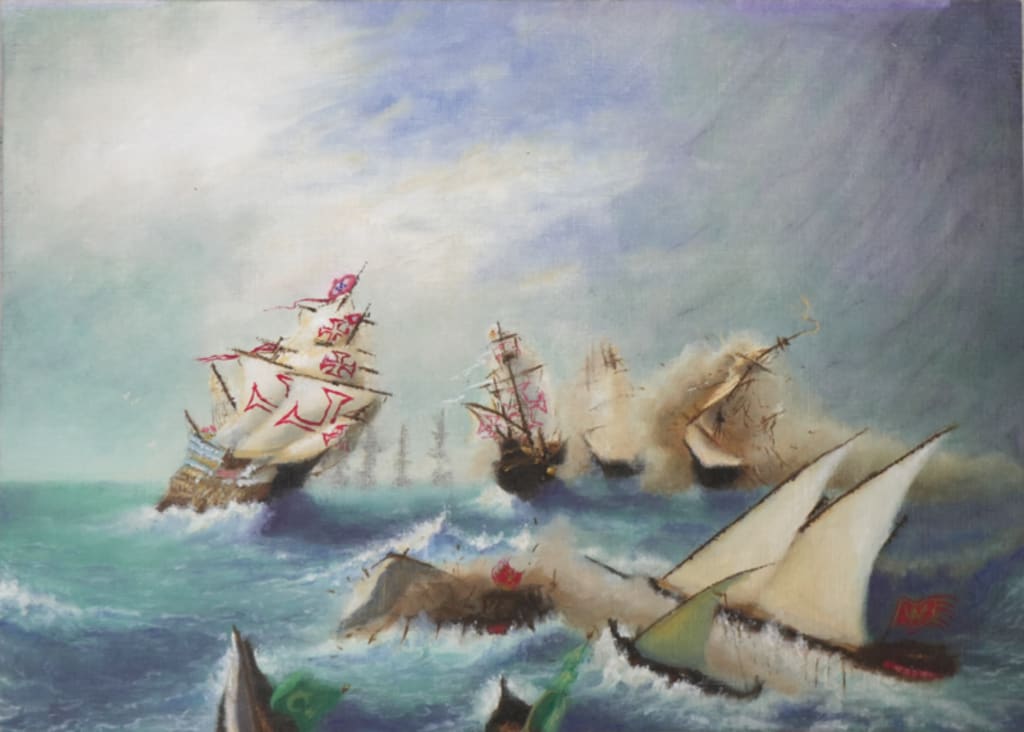The Battle of Diu 1509: Portuguese Naval Power in the Indian Ocean
The Battle of Diu: Portuguese Naval Supremacy in the Indian Ocean

The Battle of Diu, fought on February 3, 1509, stands as a pivotal event in the history of naval warfare, symbolizing the dawn of European dominance in the Indian Ocean. Led by Admiral Dom Lourenço de Almeida, the Portuguese fleet engaged in a fierce struggle with a formidable coalition comprising the Sultanate of Gujarat, the Mamluk Sultanate, the Ottoman Empire, and other regional powers. This historic clash not only showcased the technological superiority of the Portuguese but also marked a turning point in the geopolitical landscape of the early modern period.
Historical Backdrop:
The early 16th century witnessed a fervent competition among European powers for control over lucrative trade routes. The spice trade, in particular, was a coveted commodity, and Portugal, under the visionary leadership of figures like Vasco da Gama, had established a strategic foothold in the Indian Ocean. The fortified island of Diu, a crucial trading post, became a focal point of contention, drawing the attention of both European and regional powers.
Clash of Titans:
The Battle of Diu unfolded as a clash between two vastly different naval forces. The Portuguese, armed with state-of-the-art weaponry and superior naval technology, faced a coalition of diverse powers with a collective aim to challenge European expansion. The clash was not merely a confrontation of military might but a testament to the clash of civilizations, as East met West in a battle that would resonate through the ages.
You May Also Like: 450 Years of Portuguese Rule in Goa: A Colonial Legacy Explored
Admiral Dom Lourenço de Almeida's Strategic Brilliance:
At the helm of the Portuguese fleet was Admiral Dom Lourenço de Almeida, a seasoned strategist whose brilliance in naval warfare would prove decisive. Understanding the importance of superior firepower and strategic positioning, Almeida orchestrated a meticulous plan that exploited the weaknesses of the opposing forces. The battle showcased not only the technological advantage of the Portuguese but also the strategic acumen of their leadership.
Expansion of European Influence:
The Battle of Diu was not an isolated event but part of a broader pattern of European expansion into the Indian Ocean. Portuguese explorers had already opened sea routes to Asia, and the victory at Diu reinforced their resolve to dominate these vital trade routes. Subsequent to the battle, the Portuguese continued to consolidate their influence, establishing colonies and trading posts that would shape the course of history for centuries.
The Ottoman Threat:
The Ottoman Empire, a formidable power during this period, played a significant role in the coalition against the Portuguese. Recognizing the strategic importance of Diu, the Ottomans sought to counter European expansion and protect their own interests in the region. The clash with the Ottomans added a layer of complexity to the Battle of Diu, turning it into a contest not only for trade dominance but also for supremacy in the broader geopolitical context.
Legacy of Exploration and Trade:
The aftermath of the Battle of Diu marked a profound shift in the balance of power in the Indian Ocean. European nations, inspired by the success at Diu, intensified their efforts to explore and exploit the riches of the East. The spice trade, in particular, became a cornerstone of European economic interests, prompting further exploration and colonization that would shape the modern world.
You May Also Like: 450 Years of Portuguese Rule in Goa: A Colonial Legacy Explored
Trade Routes and Economic Impact:
The Battle of Diu had a lasting impact on the established trade routes of the Indian Ocean. The Portuguese, having secured their position at Diu, controlled key maritime arteries, influencing the flow of goods and wealth between East and West. This control over trade routes had not only economic ramifications but also reshaped the cultural exchange and interconnectedness of distant civilizations.
Technological Advancements:
The Portuguese dominance at Diu was facilitated by their advanced naval technology. The introduction of caravels, a type of highly maneuverable sailing ship, and advancements in artillery gave the Portuguese a significant edge over their adversaries. The battle underscored the importance of technological innovation in shaping the outcomes of naval conflicts, a lesson that resonated through subsequent centuries of maritime history.
The Enduring Impact on Geopolitics:
The Battle of Diu had enduring implications for the geopolitical landscape of the Indian Ocean. European dominance, established and solidified through victories like Diu, laid the foundation for the establishment of colonial empires. The Portuguese success at Diu inspired other European powers to venture into the Indian Ocean, setting off a chain reaction of exploration, colonization, and competition for dominance that would define the next several centuries.
Conclusion:
In conclusion, the Battle of Diu in 1509 was a defining moment in the annals of naval history, epitomizing the clash between East and West during the early modern period. Led by Admiral Dom Lourenço de Almeida, the Portuguese fleet showcased not only their technological superiority but also their strategic brilliance in navigating the complex waters of global geopolitics. The legacy of Diu reverberates through history, shaping trade routes, influencing economic structures, and laying the groundwork for the age of European colonial dominance that would follow. As we reflect on this historic battle, we gain insight into the intricate interplay of military might, geopolitical maneuvering, and technological innovation that shaped the course of world history.
You May Also Like: 450 Years of Portuguese Rule in Goa: A Colonial Legacy Explored
About the Creator
Mohammed Shahidullah-Bin-Anwar
Mohammed Shahidullah, a Blogger, writes on Historical News. After completing Master's in Bengali from Dhaka University, I accumulated over 15 years of experience in various private companies. Plz visit TIME PRINTER, you will not be upset.






Comments
There are no comments for this story
Be the first to respond and start the conversation.